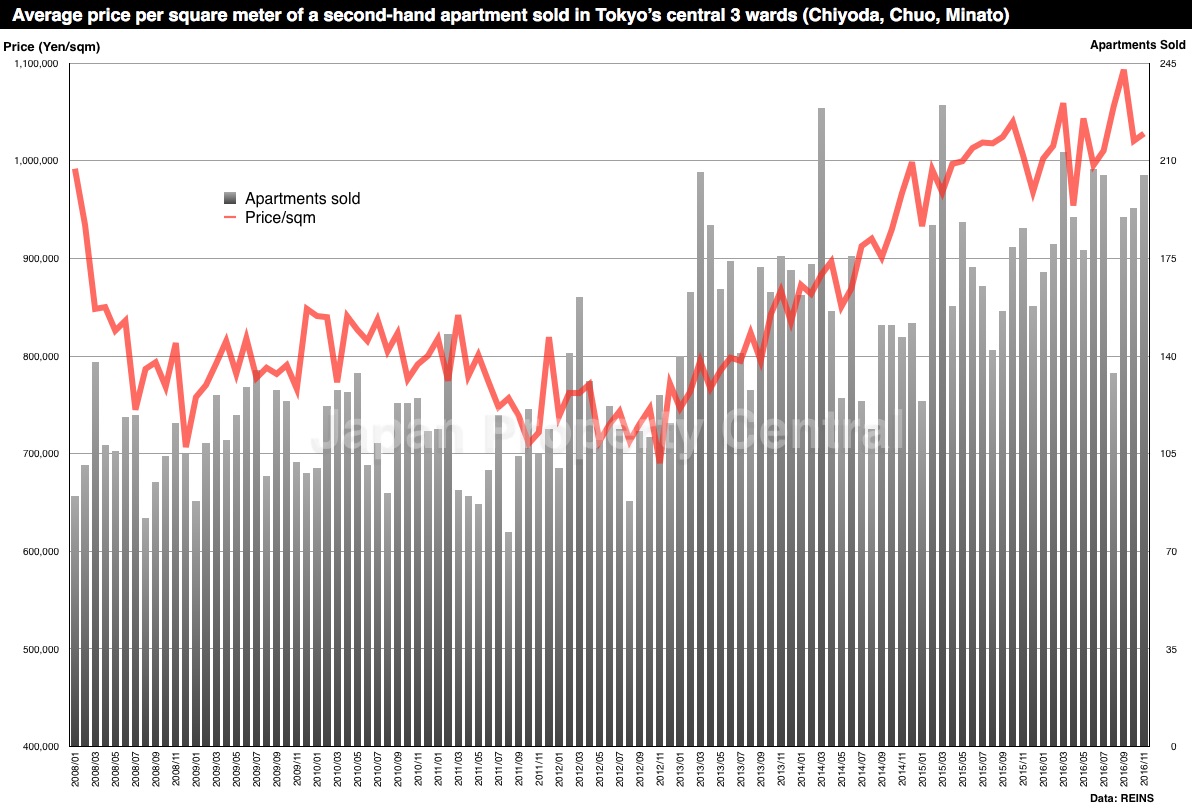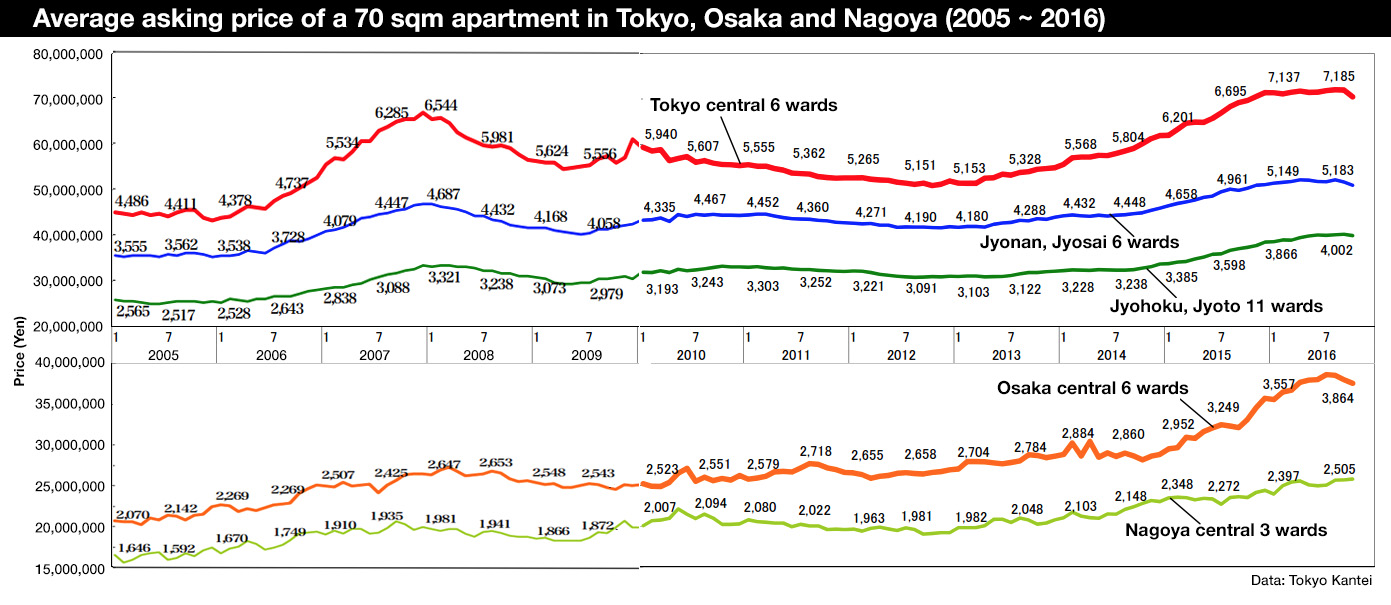Tokyo apartment sale prices increase for 50th month

According to REINS, 2,985 second-hand apartments were sold across greater Tokyo in November, down 10.6% from the previous month but up 0.5% from last year. The average sale price was 31,730,000 Yen, up 1.2% from the previous month and up 8.8% from last year. The average price per square meter was 496,800 Yen, up 2.3% from the previous month and up 8.0% from last year. This is the 50th month in a row to see a year-on-year increase. The average building age was 20.27 years.
In the Tokyo metropolitan area, 1,553 second-hand apartments were sold, down 7.7% from the previous month but up 3.5% from last year. The average sale price was 39,190,000 Yen, up 2.4% from the previous month and up 8.5% from last year. The average price per square meter was 660,300 Yen, up 3.4% from the previous month and up 6.6% from last year. The average building age was 19.12 years.
Central Tokyo’s 3 wards
In central Tokyo’s 3 wards (Chiyoda, Chuo and Minato), 205 second-hand apartments were sold, up 6.2% from the previous month and up 10.2% from last year. This is the highest number of transactions recorded for the month of November since record-keeping began in 2008, and is close to double the number of transactions seen in 2009 and 2011.
The average sale price was 57,690,000 Yen, down 1.6% from the previous month but up 7.3% from last year. The average price per square meter was 1,027,900 Yen, up 0.7% from the previous month and up 2.2% from last year. The average building age was 17.32 years.
New listings in central Tokyo were down 0.2% from last year. This is the first time in two years that the number of new listings has decreased from 12 month’s prior.
Fake rental advertisements may result in 1 month ban on portal sites
In a bid to crack down on bait-and-switch advertisements, several of Japan’s major real estate portals will soon start penalising agencies by removing all of their listings from the sites for a month or more.
Bait-and-switch advertisements involve an agency either intentionally leaving up an old listing many months after the property has been tenanted, or creating an entirely fake listing in order to attract inquiries from potential customers. A customer will call the agency to inquire about the property only to be told that it has just gone under contract and be recommended a more expensive rental. This shady practice is widespread in the real estate industry in Japan. Under the Real Estate Brokerage Act, intentionally deceptive or misleading advertising can result in a cancellation or temporary suspension of a real estate agency’s license.Read more
Two 235m towers for Shibaura

Nomura Real Estate is redeveloping one of its office towers in Shibaura, Tokyo. The 40,000 square meter site is located just south of Hamamatsucho Station on the Yamanote Line and near Tokyo’s waterfront.
The Shibaura 1 Chome Redevelopment Project will include two 235m tall buildings with a total floor area of 580,000 sqm (approx. 6.24 million sq.ft). The South Tower will be 46-stories and contain office, hotel, and retail space, with completion due for 2023. The North Tower will be 47-stories and contain office, 350 apartments, and retail space, with completion due for 2029~2030.
Tokyo Apartment Sales in November 2016

The following is a selection of apartments that were sold in central Tokyo during the month of November 2016:Read more
Old hotels closing under new earthquake retrofitting rules
 Local governments have started to publish earthquake-resistance data on hotels, hospitals, schools and other buildings across Japan. Data on over 12,000 buildings nationwide will be made public.
Local governments have started to publish earthquake-resistance data on hotels, hospitals, schools and other buildings across Japan. Data on over 12,000 buildings nationwide will be made public.
Kagawa Prefecture was the first prefecture in Japan to release data, with inspection reports on 37 hotels made public. The Tokyo metropolitan government plans to release their findings on buildings later in the capital in the second half of 2017.
Hotels, ryokans, department stores, theatres, aged care homes, schools, hospitals and other public buildings built before 1981, over 3-storeys and with a total floor area of 1,000 ~ 5,000 square meters and over are obligated to carry out an earthquake-resistance inspection, the results of which will be made public by local governments.
The introduction of these rules in 2013 has already led to a closure of several hotels across Japan.Read more
New lending for real estate in Japan reaches record high in 2016

New lending by banks to the real estate sector in Japan in the April-September period was 7.706 trillion Yen (approx. 68.9 billion USD), up 14.7% from the same period in 2015 and exceeding levels seen during Japan’s bubble economy in the 1980s for the second year in a row.
Total new lending by banks and shinkin banks across all industries was 27.376 trillion Yen.Read more
Tokyo apartment asking prices in October 2016

According to Tokyo Kantei, the average asking price of a 70 sqm (753 sq.ft) second-hand apartment in greater Tokyo in October 2016 was 36,210,000 Yen, up 2.6% from the previous month and up 13.3% from last year. This is the 10th month in a row to record an increase from the previous month. The average building age was 22.4 years.
In the Tokyo metropolitan area the average asking price was 48,550,000 Yen, up 1.0% from the previous month and up 8.8% from last year. The average building age was 22.0 years.
In Tokyo’s 23 wards the average asking price was 52,450,000 Yen, down 0.4% from the previous month but up 5.4% from last year.
In Tokyo’s central six wards (Chiyoda, Chuo, Minato, Shinjuku, Bunkyo and Shibuya) the average asking price was 70,460,000 Yen, down 2.1% from the previous month but up 1.1% from last year.
In central Osaka, asking prices were down for the 3rd month in a row. Although the decrease may partly be due to an increase in older apartments, the price increase of relatively newer buildings appears to have slowed as prices appear to be peaking out. Central Nagoya, however, saw prices increase for the fourth month in a row.
